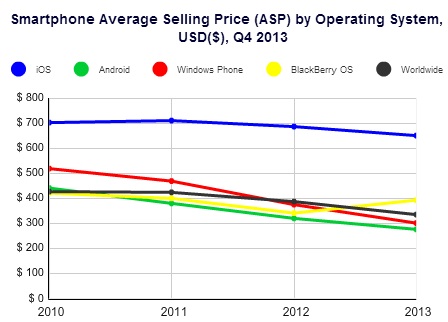Android, iOS account for 95.7% of smartphone shipments in Q4 2013
The smartphone market passed an important milestone in 2013 when worldwide shipments surpassed the 1 billion mark for the first time, driven by continued momentum from Android and iOS.

According to research firm IDC, Android and iOS accounted for 95.7 percent of all smartphone shipments in the fourth quarter of 2013 (4Q13), and for 93.8 percent of all smartphone shipments for the year.
This marked a 4.5-point increase from the 91.2 percent share that the two platforms shared in 4Q12, and a 6.1-point increase from the 87.7 percent share they had in 2012.
“Clearly, there was strong end-user demand for both Android and iOS products during the quarter and the year,” said Ramon Llamas, research manager with IDC’s Mobile Phone team.
“What stands out are the different routes Android and Apple took to meet this demand. Android relied on its long list of OEM partners, a broad and deep collection of devices, and price points that appealed to nearly every market segment.
“Apple’s iOS, on the other hand, relied on nearly the opposite approach: a limited selection of Apple-only devices, whose prices trended higher than most. Despite these differences, both platforms found a warm reception to their respective user experiences and selection of mobile applications.”
While smartphone market growth remained strong in 2013, it should be noted that the era of double-digit annual growth has only a few years remaining. In the meantime, handset vendors are doing all they can to capture demand while it is still present.
Worldwide smartphone marketing campaigns continue to stay focused on flagship devices like the iPhone 5S, Galaxy Note 3, and the HTC One, yet research shows that consumer buying is rapidly shifting toward products with significantly lower price points.
“In 2013 we saw the sub-$200 smartphone market grow to 42.6 percent of global volume, or 430 million units,” said Ryan Reith, program director with IDC’s Worldwide Quarterly Mobile Phone Tracker.
“While the market moves downstream to cheaper products it makes sense for Samsung and others to continue their marketing investments geared toward high-end products. These efforts build crucial brand perception while having less expensive alternatives that closely relate to these top products helps to close the deal.
“Samsung has done exactly this with the ‘Galaxy’ line. The family name is associated with Samsung’s high-end products, yet there are ‘Galaxy’ variants offered by Samsung at much lower price points than the Note 3 and S4. This has been an important factor in how Samsung has sustained its market lead.”
OS highlights
Android finished the year where it began: as the clear leader in the smartphone operating system race. Samsung led all Android vendors with a commanding 39.5 percent share of shipments for the year. Worth watching is a crowded list of vendors jockeying for position in 2014, including Huawei, LG, Lenovo, Coolpad, and Sony. Should Lenovo’s bid to acquire Motorola Mobility be realized, the new company will leap ahead of Huawei, which was the number 2 Android vendor in 2013.
iOS posted the lowest positive growth for both the quarter (6.7 percent) and for the year (12.9 percent), underperforming the overall market in both instances. Although it remains wildly popular in the smartphone market, Apple has been criticized for not offering a new low-cost iPhone nor a large screen iPhone in 2013 to compete with other OEMs. IDC believes the company will release a large-screen version in 2014, but will not altogether abandon the smaller 4″ screen version of previous models.
Windows Phone posted the largest increase for both the quarter (46.7 percent) and the year (90.9 percent), with each nearly doubling the growth of the overall market. Nokia easily led all vendors with 89.3 percent market share, a testament to its expanding portfolio that addressed entry-level all the way up to large-screen smartphones. What remains to be seen in 2014 is how Microsoft’s acquisition of Nokia’s smart devices will propel volumes higher.
BlackBerry was the only operating system to realize negative year-over-year change both for the quarter (-77.0 percent) and for the year (-40.9 percent). Moreover, its legacy BB7 outpaced BB10 towards the end of the year, definitely not the results that the company had hoped for when it released BB10 in January. With new leadership, management, and a tighter focus on the enterprise market, BlackBerry may in a better position, but still finds itself having to evangelize the new platform to its user base. — Newsbytes.ph
You must Sign up as a member of Effecthub to view the content.
A PHP Error was encountered
Severity: Notice
Message: Undefined index: HTTP_ACCEPT_LANGUAGE
Filename: helpers/time_helper.php
Line Number: 22
Latest Posts
- Android: CookieManager removeAllCookie() Crash
- XlistView: A listview which can pull to refresh and load more (1)
- Millions of Android Phones Could Be Affected by the Heartbleed Bug. Check to See if Yours Is One of Them
- TOP 10 ANDROID GAMES FOR MARCH 2014
- Android:Button with different textcolor and background in different states


1849 views 0 comments
You must Sign up as a member of Effecthub to join the conversation.